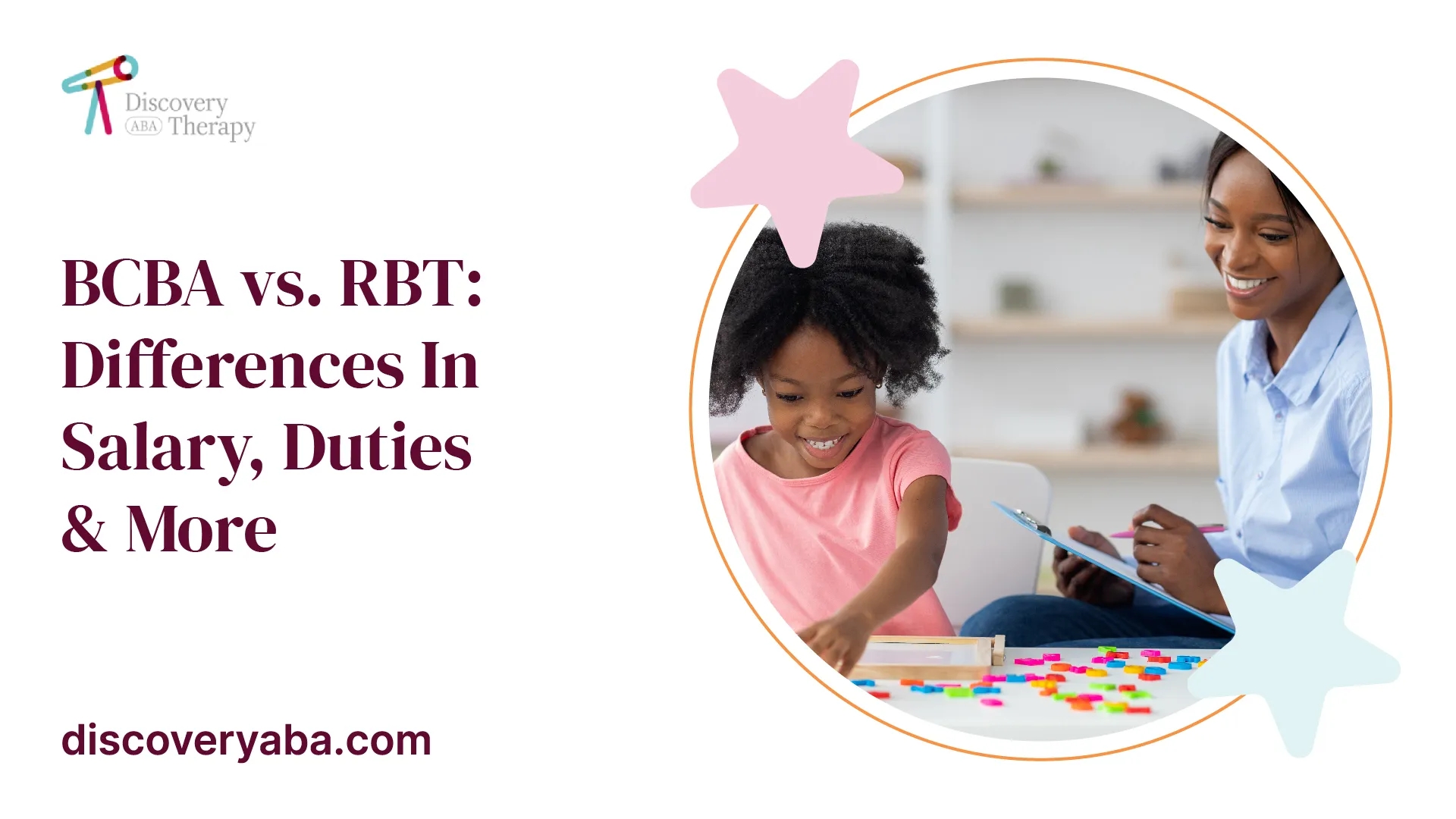BCBA vs. RBT: Differences In Salary, Duties & More
There are lots of differences between the duties, responsibilities, and salaries of BCBAs vs. RBTs.

Main Difference Between A BCBA and an RBT
The main difference between the BCBA and RBT is that a BCBA can practice independently and supervises the RBT in his or her practice. A BCBA is responsible for designing and implementing the services that RBTs frequently carry out.

BCBA vs. RBT: Differences & Similarities
- Both BCBAs and RBTs are professionals certified in the field of Applied Behavior Analysis (ABA).
- BCBAs have a master’s degree, while RBTs must complete specific coursework and pass an exam to obtain certification.
- BCBAs can design ABA programs, analyze data, develop plans for intervention strategies, and supervise technicians; whereas RBTs can only implement existing treatment plans created by a BCBA.
- However, both BCBAs and RBTs interact directly with clients to collect data on behavior changes over time.
- Additionally, they keep detailed records of progress to evaluate treatment efficacy and modify approaches as needed.
- BCBAs can also conduct assessments to determine a client’s current skills, develop an ABA program, and monitor the progress of technicians they supervise; while RBTs can only administer tests and collect data which is then analyzed by the BCBA.
- Both professionals have the ability to become board certified in order to demonstrate their expertise and knowledge in Applied Behavior Analysis.
- The main difference between BCBAs and RBTs is that BCBAs are qualified to design treatment plans, whereas RBTs are trained to implement those plans with clients.
- Additionally, while both professionals need strong communication skills to interact with clients, BCBAs must also possess excellent managerial and organizational skills to implement and oversee an ABA program.
- Both roles require continuing education to maintain certification, however BCBAs must renew their license every two years, while RBTs are required to complete 40 hours of Continuing Education credits every three years.
- The salary for a BCBA is typically higher than that of an RBT due to the increased responsibilities of designing treatment plans and managing staff members.
- Furthermore, most states have licensing regulations which limit the number of clients that a BCBA can work with at any one time; RBTs do not have this same restriction placed on them.
- Although both positions involve working with individuals in behavior therapy, the scope of a BCBA’s work is often more complex and requires a higher level of responsibility.
- Despite their differences, both professionals play an important role in providing individuals with effective behavior therapy.
- Ultimately, BCBAs and RBTs both strive to help clients reach their full potential by helping them to develop positive behaviors and eliminate negative ones.
Difference Between BCBA and RBT Salaries
The average RBT salary is approximately $54,000 per year in the U.S, and the average BCBA salary is $75,784 per year.
Difference Between BCBA and RBT Responsibilities
BCBAs are responsible for designing treatment plans and overseeing the activities of the RBTs that they supervise. They also conduct assessments, analyze data, develop intervention strategies, and monitor the progress of their clients.
By contrast, RBTs are trained to implement existing treatment plans created by a BCBA with clients.
Additionally, they collect data on behavior changes over time and document their findings in order to evaluate treatment efficacy. Ultimately, while both professionals play an important role in providing effective behavior therapy to individuals, the scope of a BCBA’s work is often more complex due to its higher level of responsibility.
The primary difference between a BCBA and an RBT is that only BCBAs can practice independently and supervise the activities of other ABA professionals.
Additionally, a BCBA’s salary is typically higher than that of an RBT due to the increased responsibilities associated with their role. Finally, most states have licensing regulations which limit the number of clients that a BCBA can work with at any one time; whereas RBTs do not have this same restriction placed on them.
Difference Between BCBA and RBT Certification Requirements
In order to become certified as either a Board Certified Behavior Analyst (BCBA) or Registered Behavior Technician (RBT), candidates must meet certain qualifications.
For example, in order to become a BCBA, individuals must complete graduate-level coursework in Applied Behavior Analysis and pass an assessment provided by the Behavior Analyst Certification Board.
For those wishing to become an RBT, they must obtain a minimum of 40 hours of training and pass the certification exam administered by the same board as the BCBA.
Additionally, both professionals must complete continuing education credits in order to maintain their certification; however, BCBAs are required to renew their license every two years, whereas RBTs are only required to complete 40 hours of Continuing Education credits every three years.
Ultimately, while both certifications involve working with individuals in behavior therapy, these differences in requirements reflect the different levels of responsibility associated with each role.
Difference Between BCBA and RBT Skills and Knowledge
BCBAs and RBTs both possess a set of skills and knowledge that are necessary for providing effective behavior therapy. BCBAs have a more advanced set of skills, due to the higher level of responsibility associated with their role.
They must be able to assess each individual’s needs, create treatment plans accordingly, collect data in order to evaluate treatment efficacy, and supervise other ABA professionals.
In contrast, RBTs typically focus on direct implementation of interventions specified by the BCBA. This includes monitoring changes in behavior over time, providing feedback to clients on their progress towards goals, and helping individuals learn new skills or modify existing behaviors.
Additionally, RBTs must understand how to use different intervention strategies such as positive reinforcement or shaping. Ultimately, both roles require a comprehensive understanding of evidence-based practices in Applied Behavior Analysis.
By combining the skills and knowledge of BCBAs with RBTs, behavior therapists are able to provide clients with the highest quality care available.
Conclusion
BCBAs and RBTs play an important role in providing effective behavior therapy services for individuals with special needs. While there are some similarities between their responsibilities, the scope of a BCBA’s work is often more complex and requires a higher level of responsibility.
Additionally, there are certain requirements which must be met in order to become certified as either a Board Certified Behavior Analyst (BCBA) or Registered Behavior Technician (RBT).
Ultimately, while both professionals strive to help clients reach their full potential by helping them to develop positive behaviors and eliminate negative ones, it is important to understand the differences between these two roles in order to ensure that individuals have access to the highest level of care.
Thus, it can be seen that BCBAs and RBTs play critical roles in providing effective behavior therapy services for those with special needs.
By understanding the differences between these two positions, it is possible to ensure that individuals receive the best care available. Ultimately, both roles are essential for providing quality behavior therapy services and should be used in combination for maximum effectiveness.
Does Your Child Have An Autism Diagnosis?
Learn More About How ABA Therapy Can Help
Find More Articles
Contact us
North Carolina, Nevada, Utah, Virginia
New Hampshire, Maine
Arizona, Colorado, Georgia, New Mexico, Oklahoma, Texas
.avif)




































































































